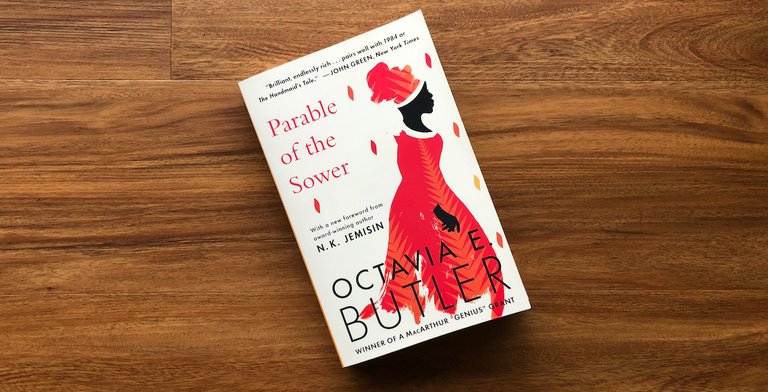— Mark 4:3–9 (ESV)
There's plenty of room in Sci-fi for the exploration of what if scenarios. Since the pandemic started, I've been reading books about dystopic and post-apocalyptic nature. Octavia Butler's Parable of the Sower had been in my to-read list for quite some time. It was good that my list of novels intersected with my reading run. I'll try to explore some of the themes present without spoiling the novel. Hopefully, this will get more people interested in picking it up.
Synopsis
The Post-Apocalyptic nature of the setting in this novel is one born from economic situations. An sky-rocketing inflation has hit The United States so hard that most jobs do not pay wages, water has become a commodity, cops are abusing their power to the extreme, poor become poorer, and society devolves into gangs, walled communities, peddlers and travelers. People wander the highways looking for better places to stay and jobs to do.
With a dire economic situation, the skeletons in the closet come out. The return of slavery disguised as jobs is present in company-owned towns and frontier factories. Drug abuse becomes a danger to what little order remains. A new compound drives people into pyromania. Communities, land and people alike are burnt down for pleasure.
In the midst of this situation, a young girl, Lauren, born with Hyper-empathy Syndrome, tries to make sense of her life in an upside-down society where prospect of a better life seems unattainable. in her despair, a comfort is found throw her own concept of god, Earthseed. Armed with her newfound sense of life and her belongings. She embarks into a journey to the north looking to establish herself and spread her teachings along the way.
But outside her walled community, life isn't easy. She will need allies, money, water, food and, more important, to achieve her goal. Are her goals achievable in a land where gang turf wars happen every day? Or where falling asleep could mean losing your stuff and life?
About the Book (trying not to spoil anything)
Not getting too deep into the themes of the book, it is a captivating story. It plays out as an allegory to the Parable of the Sower from the Christian Gospel. But it's elements an setting make it interesting. First, we have a strong female protagonist trying to change the world bit by bit. There's this lovely moment when she decides to learn as much as she can to survive the harsh world where she lives and her meditations to get to understand her new religion makes it even better. God is Change as Lauren sure shows a resilience adapting to the changes thrown by life.
Second, the Post-Apocalyptic nature of the book isn't quite that. The society has devolved into what Thomas Hobbs would've called the natural state of society. Every men is out for himself and power is the rule of law. It is a frightening scenario because the collapse of an economy is something that might happen any time. In world driven by money, those who hold the means to generate it will find ways to abuse power. Happens in our reality; also in fiction. Also, Governments tend to lean towards whatever means can help them survive. People's rights are stripped away. Some are willing to sell their freedom for security and as in ancient and not so ancient times, there's the return of slavery disguised as work opportunities.
These are just some of the prospects about this book. At least, the ones I can mention without getting too deep into the story and spoil the details of a great piece of writing.

Oh, I've heard of this author. I love post apocalyptic fiction and this sounds like one to add to the list.
It is a wonderful read. I had it in my list for so long and well, it was amazing that I could finish reading it so quick.
Sounds very interesting! Thank you for this recommendation! I have been reading sci-fi dystopian novels since high school and all I can say is that some of them aren't that far away from our reality or the real world. Anyway, I hope for the better. This pandemic will go away... when though? That is a very harsh and difficult question. Last but not least, keep up the good work! Cheers! :)
I think the pandemic got me back on track with sci-fi reading. The whole dystopic future theme came like a natural thing. I bet you'd enjoy this one. :D
So does it seem indeed. Thank you for this recommendation once again. I'm also rather fearful regarding any dystopian book. :)
Why? I think it gives a lot of insight into what humanity could or not do for creating such futures. At their bare minimum, they serve as cautionary tales.
Well, yes, you're right, if put things into this particular manner.
Cheers to you as well! :)
I work in a second-hand book shop and people keep asking me for Octavia Butler but we never get her in. This sounds great, I must keep an eye out
She has some dense work, but it is an interesting exploration of many things some racial problems, coming of age, slavery, and many many other convoluted topics in the guise of Sci-fi.